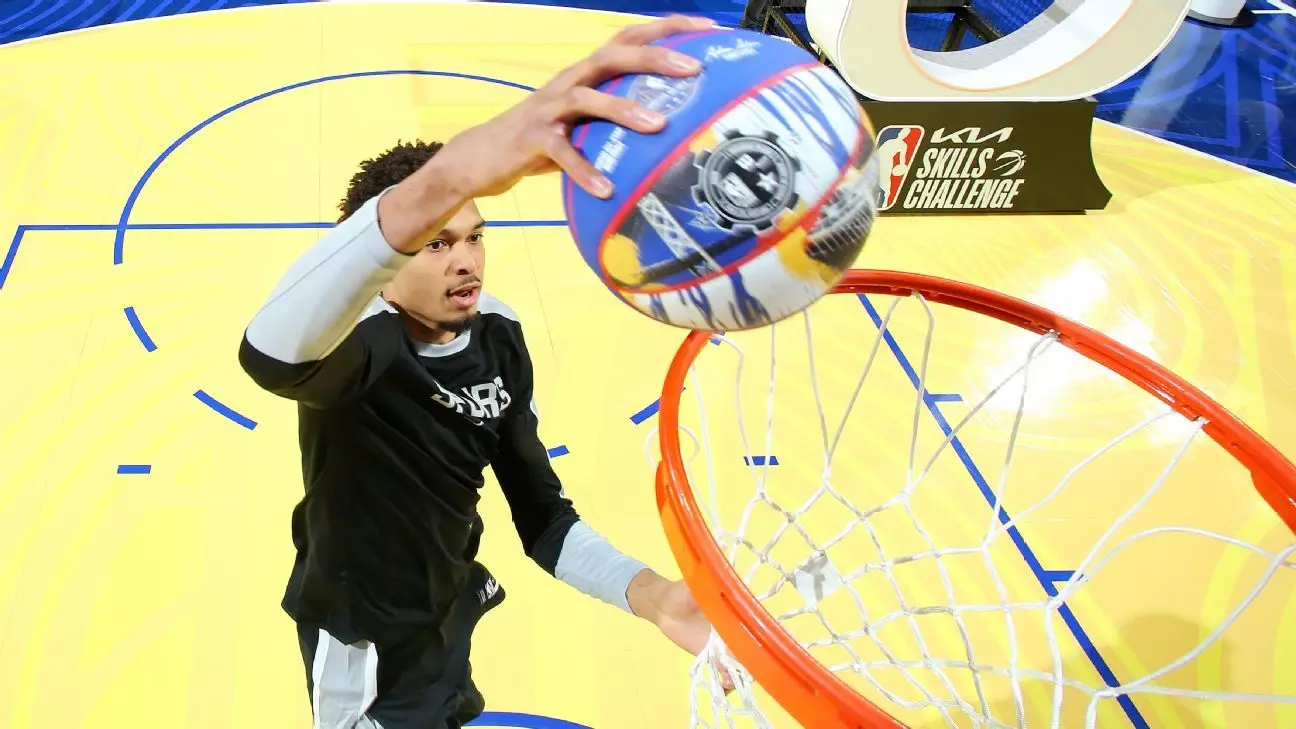The annual Kia Skills Challenge has long been a highlight of the NBA All-Star Weekend, showcasing players’ multifaceted talents in passing, shooting, and overall game play. This year, however, the event did not unfold without a significant controversy, raising questions about interpretation of the rules and the spirit of competition. While Team Cavaliers, led by Donovan Mitchell and Evan Mobley, emerged victorious against Team Warriors with their impressive time of 1:00.03, the event’s narrative was largely shaped by the problematic performance of Team Spurs, featuring Chris Paul and Victor Wembanyama.
The Skills Challenge is designed to challenge players with a variety of drills that test their passing and shooting abilities. Participants navigate an obstacle course, performing tasks that require agility and precision while trying to achieve the fastest completion time. This year, the teams consisted of notable stars, and anticipation built around the potential strategies each would employ to gain an edge in this showcase of skill.
Team Spurs, however, took an unconventional approach that ultimately led to their disqualification. By emphasizing passing and neglecting to attempt legitimate shots—aside from a single dunk by Wembanyama—they aimed to maximize their speed. Initially, this declined response saw them clock in at 47.9 seconds in the opening round, a time that seemed promising and competitive, but one that ultimately backfired due to failure to adhere to the challenge’s shooting rules.
As Team Spurs advanced through their sequence, their disregard for process became apparent. They opted for a strategy that saw them disregarding one crucial requirement: the need to take legitimate shots. Wembanyama and Paul threw the basketballs toward the rim rather than attempting to sink them, believing that quantity would outweigh quality. Unfortunately, this led to a review by the officials, quickly transforming a seemingly intelligent strategy into a disqualification due to a clear violation of the challenge’s rules.
This incident raised eyebrows among observers, particularly as discussions surrounding the legality of their strategy swirled. Draymond Green later highlighted that Wembanyama had reached out to league officials for clarification about the rules beforehand, suggesting confusion existed not just among the competitors but potentially within the governing structure of the event itself.
The aftermath of the Spurs’ decision invites broader discussions surrounding the intention of competition rules. The Skills Challenge is not just about speed; it’s also an evaluation of skill and adherence to traditional measures of success in basketball. By attempting to exploit what they perceived to be a loophole, Team Spurs ignited debates about the integrity of the event.
Paul’s appeals to contest their disqualification illustrate a desire among players to innovate and take risks. Yet, the failure to recognize the importance of fulfilling the entirety of the competition requirements raises questions about sportsmanship. When does strategy become an unfair advantage, and how do teams balance creativity with compliance?
The events of this year’s Kia Skills Challenge may serve as a cautionary tale moving forward. The NBA could benefit from reviewing and clarifying the rules to prevent future misunderstandings while ensuring that all competitors can engage with the challenge’s spirit. Furthermore, it might be time to consider introducing clearer guidelines surrounding innovative tactics and strategies to maintain an appropriate competitive balance.
While Team Cavaliers celebrated their win on one side of the coin, the disqualification of Team Spurs revealed deeper issues regarding the nature of competition and rule adherence. The NBA community’s response to this controversy will likely shape future competitions, encouraging a commitment to not only winning but also understanding the core tenets that define the sport. The Skills Challenge remains an opportunity for players to showcase their ingenuity—but it is essential to remember that true skill lies in maneuvering within the established framework.

